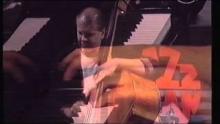The Metronome
I just have to tell you guys. I have so much fun with a metronome. I know there are guys that don't think they are cool, but I love working with a metronome. It helps me so much to learn about time!
I just put it on 2 and 4 and play. I can feel my time waver a bit and I can see it's tendencies. I learn so much. Man, try learning a bebop head and then putting the metronome on 2 and 4. See where the accents are, the off beat phrases, etc. Try it out and let me know what you think!
I dig it!
- Read more about The Metronome
- 6 comments
- Log in or register to post comments






